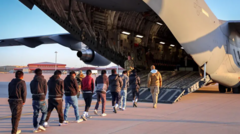In a recent development, the Colombian government reached an agreement with the Trump administration, solving a brewing trade war over the deportation of migrants. The conflict arose when President Gustavo Petro banned landed military flights repatriating Colombian migrants from the U.S. After threats of hefty tariffs on Colombian exports were made by the White House, Petro’s administration shifted strategies to prevent economic fallout.
Colombia and US Avoid Trade War Over Deportation Flights

Colombia and US Avoid Trade War Over Deportation Flights
Colombia agrees to allow US military flights carrying deported migrants to evade potential tariffs following a diplomatic dispute.
On Sunday, a conflict arose when President Petro explicitly barred U.S. military aircraft from landing with deported Colombian migrants, prompting President Trump to threaten punitive tariffs on Colombian goods. As tensions escalated, the situation took a dramatic turn when Colombian officials opted to accept the return of deportees to sidestep a possible trade crisis. The White House quickly responded, describing the agreement as a triumph of Trump's tough immigration policy.
The stakes were raised sharply when President Trump publicly condemned Petro's decision on social media, arguing that the rejection of repatriation flights posed risks to U.S. national security. He suggested that tariffs could soar up to 50% and added travel bans for Colombian officials as reinforcement. Facing increasing pressure, Colombia's Foreign Minister Luis Gilberto Murillo declared a resolution, indicating Colombia's acceptance of deportation flights while reiterating the option to send Air Force One to transport deportees dignifiedly.
Last seen in 2024, when Colombia accepted 124 repatriation flights, the events of this week signify a strain in a country known for its strong historical ties with the U.S. Given the pivotal role Colombia plays in the drug war, many anticipated significant impact from potential tariffs that could affect trade worth $53.5 billion in 2022. As the dust settles, the diplomatic resolution reinstates an important partnership, but concerns linger about the treatment of migrants in transit and impending scrutiny for Colombians arriving in the U.S.
As both nations engage in dialogue, Colombian authorities are expected to ramp up discussions in Washington while maintaining a delicate balance between national dignity and international obligations. The tensions surrounding migrant treatment, trade, and diplomatic relations remain critical issues on the Colombian agenda.
The stakes were raised sharply when President Trump publicly condemned Petro's decision on social media, arguing that the rejection of repatriation flights posed risks to U.S. national security. He suggested that tariffs could soar up to 50% and added travel bans for Colombian officials as reinforcement. Facing increasing pressure, Colombia's Foreign Minister Luis Gilberto Murillo declared a resolution, indicating Colombia's acceptance of deportation flights while reiterating the option to send Air Force One to transport deportees dignifiedly.
Last seen in 2024, when Colombia accepted 124 repatriation flights, the events of this week signify a strain in a country known for its strong historical ties with the U.S. Given the pivotal role Colombia plays in the drug war, many anticipated significant impact from potential tariffs that could affect trade worth $53.5 billion in 2022. As the dust settles, the diplomatic resolution reinstates an important partnership, but concerns linger about the treatment of migrants in transit and impending scrutiny for Colombians arriving in the U.S.
As both nations engage in dialogue, Colombian authorities are expected to ramp up discussions in Washington while maintaining a delicate balance between national dignity and international obligations. The tensions surrounding migrant treatment, trade, and diplomatic relations remain critical issues on the Colombian agenda.






















